Reading Ademe study : comparison of life cycle of an electric vehicle
A fairly comprehensive study was commissioned by ADEME to compare electric and internal combustion vehicles with respect to energy and environmental aspects. It sets the date of analysis to 2012 and seeks to extrapolate these results to 2020.
The study contains data for the case of France and Germany. The situation in these countries is different due to French specificities : our electricity is mainly nuclear one, other part is about massive ratio of diesel vehicles.
One of the parameters set at the beginning of this study relates to the vehicle : it performs an average distance of 80 kms per day. His lifetime is set to an arbitrary 150,000 kms (see below) and 10 years. The vehicle is an urban car or a light commercial vehicle.
Reading the study
Comparison for France in 2012
The study provides a summary chart comparing vehicles for France in 2012.
First interesting point : the primary energy consumption of a diesel vehicle is fairly better compared to an electric vehicle .
From an environmental point of view , the electric vehicle makes a clear advantage over conventional vehicles . Only the acidification potential is greater for electric vehicles , this being related to battery manufacturing. The overall result is , once again , strongly linked to the French situation favoring nuclear power.
Is this one of the reasons prompting the French car manufacturers to propose electric cars ?
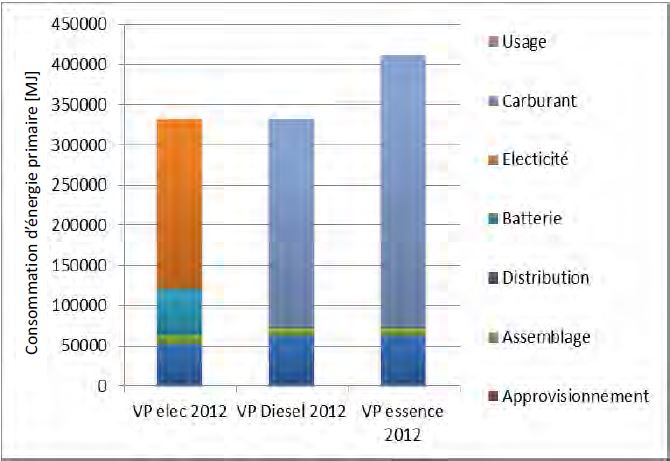 If we have a look at primary energy usage for the different types of vehicles , we can see that :
If we have a look at primary energy usage for the different types of vehicles , we can see that :
- the major share of primary energy used in gasoline vehicles is linked to to fuel. However, all other items are not to be overlooked : about 20 % of the energy is used on other items ( mainly manufacturing of the car )
- In the case of electric vehicles, others uses than electricity represents about 40% of primary energy and mainly covers manufacturing of the car and battery
Comparison for Deutschland in 2012
 In the case of Germany, the advantages of electric vehicles are balanced compared to disadvantages.
In the case of Germany, the advantages of electric vehicles are balanced compared to disadvantages.
Next year projections up to 2020
The study attempts to extrapolate the results for 2020. There are different kind of changes expected during the coming years :
- change of the electrical Mix. In general, a greater percentage of renewable energy will be integrated in 2020

- regarding batteries :
- cleaner technologies
- improvement of energy density
- improvement of battery lifetime
- about gasoline cars, improvement of efficiency thanks to lighter vehicles
Improvements expected between 2012 and 2020 are summarized in the table below :
However, the results should be taken with a grain of salt, the variability of the projection is very important. We can refer for example to the curve related to potential variability of climate change: Electrical Vehicule related area overlap extensively the one for gasoline cars
local pollution
Three areas are addressed in the study :
- specific laws for in urban traffic could appear and benefit to electric vehicles
- urban air pollution
- noise
Electric vehicles have a clear interest regarding noise, but below 50 km / h, friction noise of wheels being predominant above this speed.
Noise reduction in cities is very smal in 2020 because of small amount of electric vehicles expected (2.8%)

Personal reading of the study
Lifetime of vehicle
The study was conducted for a vehicle mileage of 150,000 kms corresponding to 10 years.
This lifetime seems to me very limited, in regards to available technology that permits to produce long term reliable vehicles. I personaly expect of a car that it reachs at least 250,000 kms without major problems, in my case with a larger annual mileage. Improved longevity is also a good point for electric vehicles. For example, in the case of primary energy consumption, the balance is in favor of diesel vehicle at 150,000 kms, but it reverses at 170,000 kms:
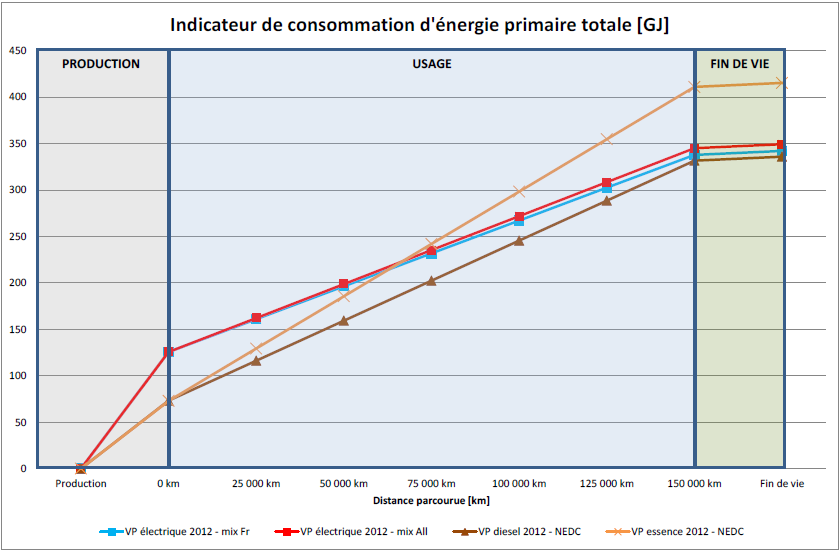
To go a step further, lifetime of vehicles should be a key element to improve the ecological balance, more than accountability, an outcome should be specified.
However cars become more and more a standard consumer product. This reduce artificially lifetime of those. This factor can also be improved : preventing quick obsolescence of vehicles, allowing the retrofitting of vehicles, etc. ..
Do we have to buy an electric car ?
If we limit ourselves to the results of this study, it appears that in general the answer is negative in Germany.
It is different in France, it is in favor of electric vehicles thanks to nuclear electricity. Whether we agree or not with nuclear energy, nuclear power plants are now present and the worst thing we could do from an ecological point of view would be to prevent us to use them.
Nevertheless, some aspects can put some advantages about electric vehicle:
- annual mileage exceeds the scope of the study
- expected lifetime is higher than the reference one in the study
- possibility to access freely to charging station
- a willingness to reduce direct pollution of vehicles, for example by introduction specific laws to reduce pollution in urban areas
Why I still would like to have an electric car
In my case, the situation is this one :
- +Annual mileage exceeds the scope of the study
- + I expect a car lifetime much longer than what is stated in the study.
- – I do not have access to free charging station
- – I don’t particularly focus on reducing pollution, I do not live in a polluted urban environment .
More than that, I have no way to know at which extent my vehicle generates pollution . Is it slightly hazardous , normal situation, very important. I don’t know …
The first two points are not sufficient to give the score to electric vehicule . I still think this is good solution for different reason :
- noise reduction
- theoretical reliability of an electric vehicle . An electric vehicle is mechanically simpler than gasoline vehicle. Apart from conventional wear parts , only the battery is affecting the maintenance budget.
- I do not expect anymore anything from oil industry :
Super tanker are larger and larger, oil extraction methods are more and more complex, but less and less earth friendly. Green fuels is also tested , but results are still mitigatd .
I expect more from electrical industry : many innovations are already being studied, target being to improve the efficiency of this energy ( smart grid , energy carruying with personal cars, new generation of batteries …). Moreover, the integration of renewable energy sources in the electricity sector is under control today.
Don’t forget also this other kind of electric vehicles
Electric vehicles are not only cars. This is the contrary: electric bicycles have become common, electric scooter have also done the buzz on stand of car / moto manufacturers this year. Those type of vehicles could be the future of transportation.
Annexes
Other useful information
- Preferred chargin mode for electric vehicles is slow mode ( 8kw/h meaning 240V / 32A ), thanks to his better efficiency
- An interessant chart to link generated pollution to drive speed.

Best situation regarding pollution is about 80 km/h - Some explanation about the way fuel consumption is done ( ECE R101 rules )

- Comparison of electric mix between european countries

- Interesting information about car batteries :
“Dans le scénario de référence, il est supposé que la durée de vie de la batterie est la même que la durée de vie du véhicule. C’est ce qui est actuellement demandé dans les cahiers des charges des batteries émis par les constructeurs. Cependant, le manque de retour d’expérience fait peser une forte incertitude sur ce point. 2 scénarios modélisant la réduction de la durée de vie de la batterie ont été réalisés … Pour ce scénario, il est supposé que 1,2 batteries sont nécessaires sur l’ensemble du cycle de vie du véhicule électrique”
Car manufacturers are requesting us today to monthly fee specifically for battery maintenance, altough they should last the entire vehicle lifetime. In reality, mean lifetime of batteries seesm to be something like 150 000 kms / 1,2 = 125 000 kms.

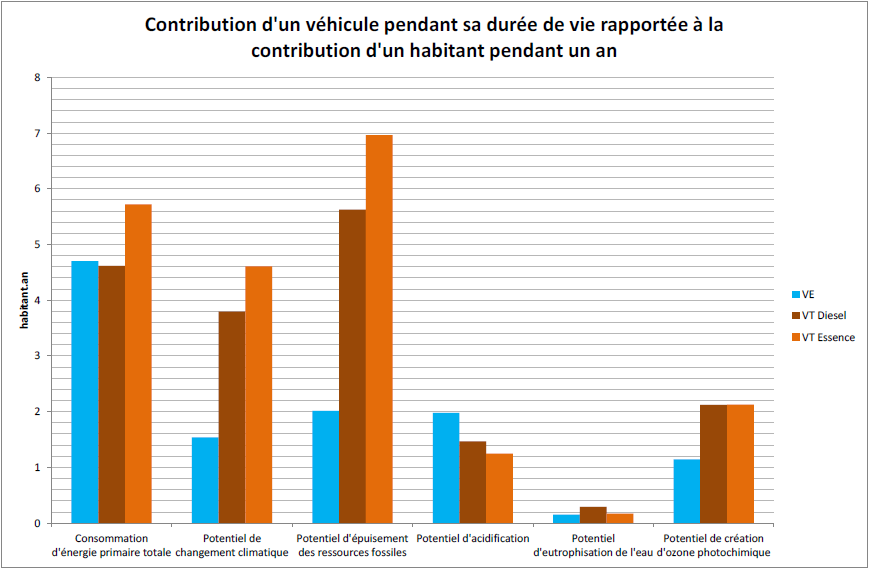



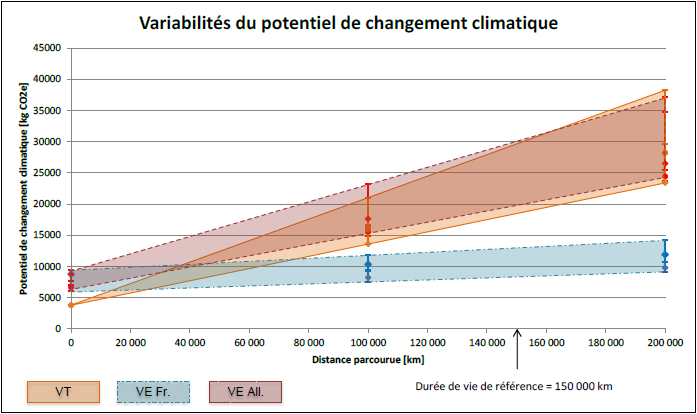
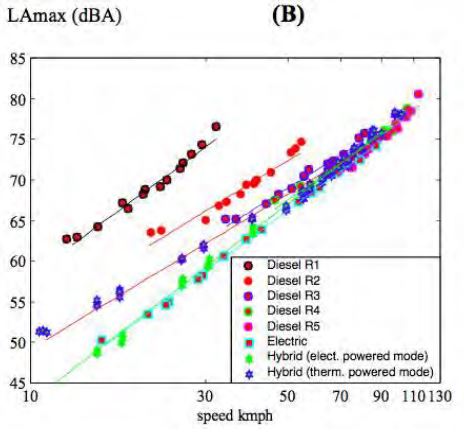
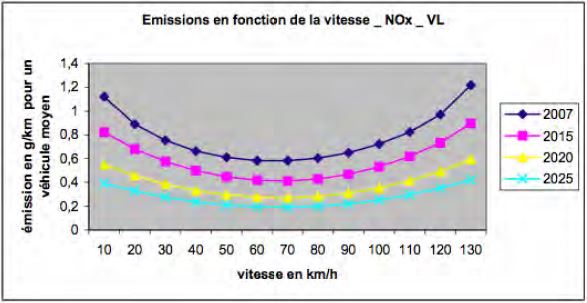
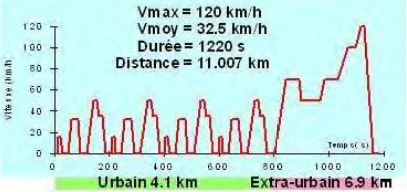
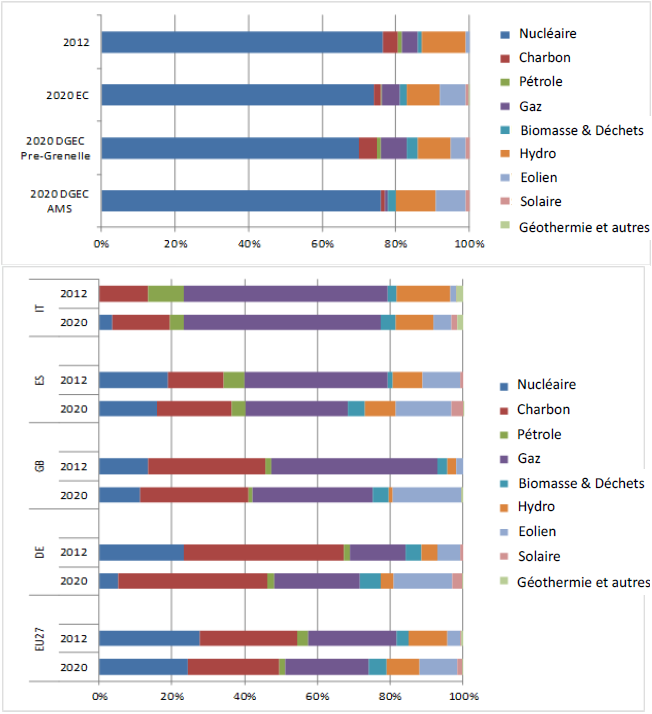
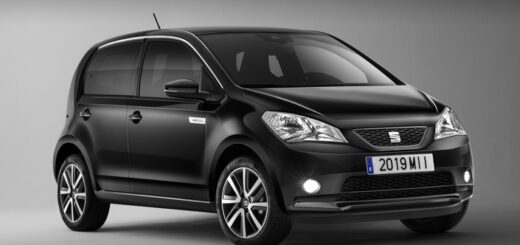

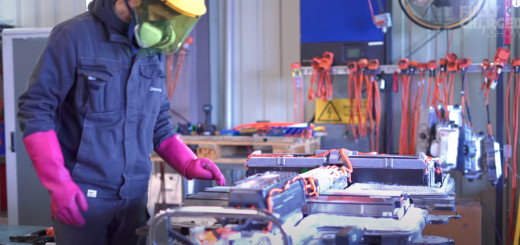
Bonjour,
Il me semble que le site de l’ADEME, qui a dû connaître un souci informatique, est de nouveau opérationnel.
L’étude se trouve ici : https://librairie.ademe.fr/mobilite-et-transport/3273-elaboration-selon-les-principes-des-acv-des-bilans-energetiques-des-emissions-de-gaz-a-effet-de-serre-et-des-autres-impacts-environnementaux.html#/44-type_de_produit-format_electronique
Le téléchargement semble connaître des soucis mais on peut récupérer le document via une recherche google directe en tapant quelques mots clés du titre.
Merci en tout cas pour avoir cité et présenté ce document.
Merci pour cette mise à jour !
Bonjour Monsieur,
C’est un sujet qui m’intéresse beaucoup et je recherche désespérément cette étude faite par l’ADEME. Sauriez-vous m’indiquez ou aviez vous pu trouver cette fameuse étude pour que je puisse la regarder dans toute sa longueur.
Merci d’avance
JB
Bonjour, Effectivement le lien sur SlideShare n’est plus fonctionnel et il semblerait que le site de l’ADEME soit HS ( parti en fumée chez OVH ?). Malheureusement je n’ai plus ce document et ne peux donc pas vous le fournir. Désolé.